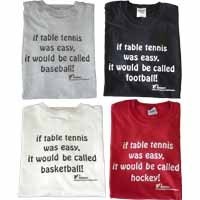English Language
answer this question
English Language Question
Is the sentence "If table tennis was easy, it would be called football"! correct?
So I was at this cafe today and saw a dude wearing this t-shirt (it was the football version..we are Germans we don't play baseball or basketball or GOD FORBID Candian hockey*coughlesbiancough*).
Now of course the German version of this sentence is: If table tennis would be easy, it would be called football. Which is incorrect but you hear a lot.
I would say
"If table tennis were easy, it would be called football" much like Beyonce sings: If i WERE a boy.
But somehow..since this is printed on a t-shirt..I thought that maybe both are correct? Or the t-shirt is correct? and I'm wrong?(it happens...)
And if so: when would i use "was" and when would i use "were"?
And also why is it table tennis (two words) but football (one word?)
And why does the spo..club icon look like the "Books to read" one? It had me mighty confused =P
Now of course the German version of this sentence is: If table tennis would be easy, it would be called football. Which is incorrect but you hear a lot.
I would say
"If table tennis were easy, it would be called football" much like Beyonce sings: If i WERE a boy.
But somehow..since this is printed on a t-shirt..I thought that maybe both are correct? Or the t-shirt is correct? and I'm wrong?(it happens...)
And if so: when would i use "was" and when would i use "were"?
And also why is it table tennis (two words) but football (one word?)
And why does the spo..club icon look like the "Books to read" one? It had me mighty confused =P

|
next question » | ||
|
|
|||







